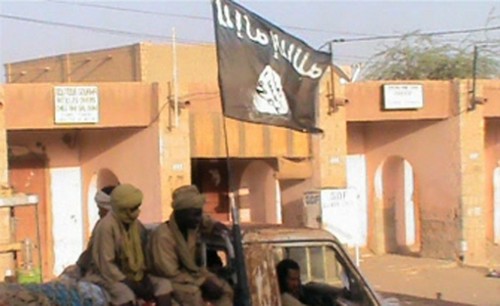
Photograph of a truck carrying members of the Islamist Ansar Dine of northern Mali. There is a black flag symbolizing there Islamic orientation flying overhead on the vehicle., a photo by Pan-African News Wire File Photos on Flickr.
U.N. members divided over response to Mali crisis
9:52pm EDT
By John Irish
UNITED NATIONS (Reuters) - U.N. members appeared deeply divided on Wednesday as they sought to resolve the crisis in Mali, with France and some of Mali's neighbors backing possible military intervention, while the United States said the West African nation must first have an elected government.
A special U.N. session on Mali, held on the sidelines of the annual General Assembly, was intended to devise a plan for a nation that descended into chaos in March after a military coup toppled the president, leaving a power vacuum that enabled local Tuareg rebels to seize nearly two-thirds of the country.
Islamist groups have since hijacked the rebellion in the north, imposing strict Islamic law in regions under their control and spurring fears that religious extremist fighters could further destabilize the region.
Islamist groups including the al Qaeda-linked Ansar Dine have carried out public whippings of alleged adulterers and destroyed UNESCO-listed shrines of local saints in the ancient town of Timbuktu, arguing such worship was un-Islamic.
"There is an urgency to act to end the suffering of the people of Mali and to prevent a similar situation that would be even more complicated in the Sahel and the rest of the world," Malian Prime Minister Cheick Modibo Diarra told the General Assembly.
France, Mali's former colonial power, called on Wednesday for the U.N. Security Council to adopt as soon as possible a resolution enabling military intervention in northern Mali, a call that has been supported by some West African nations that fear Mali's chaos will spread beyond its borders.
French President Francois Hollande warned that Mali's territorial integrity should be restored as soon as possible and that any lost time would only complicate matters.
He said he wanted a resolution on Mali to be approved within weeks. France has ruled out intervening directly, but has promised logistical and intelligence support.
Hollande's calls were echoed by some of Mali's neighbors, including Niger, whose foreign minister, Mohammed Bazoum, told delegates that only an armed intervention supported by friendly powers could eradicate insecurity in the region.
'A POWDER KEG'
But U.S. Secretary of State Hillary Clinton signaled caution, saying immediate efforts should concentrate on putting a legitimate government back in power in Mali before its internal divisions are addressed.
"This is not only a humanitarian crisis; it is a powder keg that the international community cannot afford to ignore," Clinton said in her remarks.
"In the end, only a democratically elected government will have the legitimacy to achieve a negotiated political settlement in northern Mali, end the rebellion and restore the rule of law," Clinton added.
The fragile interim government that now holds Mali's capital, Bamako, requested a U.N. Security Council resolution earlier this month, and the West African regional body ECOWAS has said it would be ready to send in troops.
But diplomats say the Security Council remains unlikely to provide a mandate for military intervention until ECOWAS outlines a more detailed strategy, including troop numbers and costs of the operation.
The Mali conflict has exacerbated a deteriorating humanitarian and security situation in the turbulent Sahel region - a belt of land spanning nearly a dozen of the world's poorest countries on the rim of the Sahara - where drought has pushed millions to the brink of starvation.
African Union Security Commissioner Ramtane Lamamra told Reuters on Tuesday that Mali's interim leaders were capable of managing the crisis and needed full international backing.
"How can we organize elections when northern Mali is occupied by terrorist movements that don't apply democracy?" Hollande said when asked if elections should be held first.
U.N. Secretary-General Ban Ki-moon cautioned that any military action could have serious humanitarian consequences. More than 400,000 people already have been forced to flee their homes.
Ban said the United Nations was developing a strategy on the Sahel that would look as a whole at issues including security, response to large-scale crises, and the promotion of democratic governance. Ban said he would appoint an envoy to manage the process, but did not name the person.
Britain said it had also appointed an envoy to the region.
On July 5, the Security Council endorsed political efforts by the 15-nation ECOWAS - the Economic Community of West African States - to end the unrest in Mali, but stopped short of backing military intervention there.
(Additional reporting by Andrew Quinn; Editing by Peter Cooney)
No comments:
Post a Comment